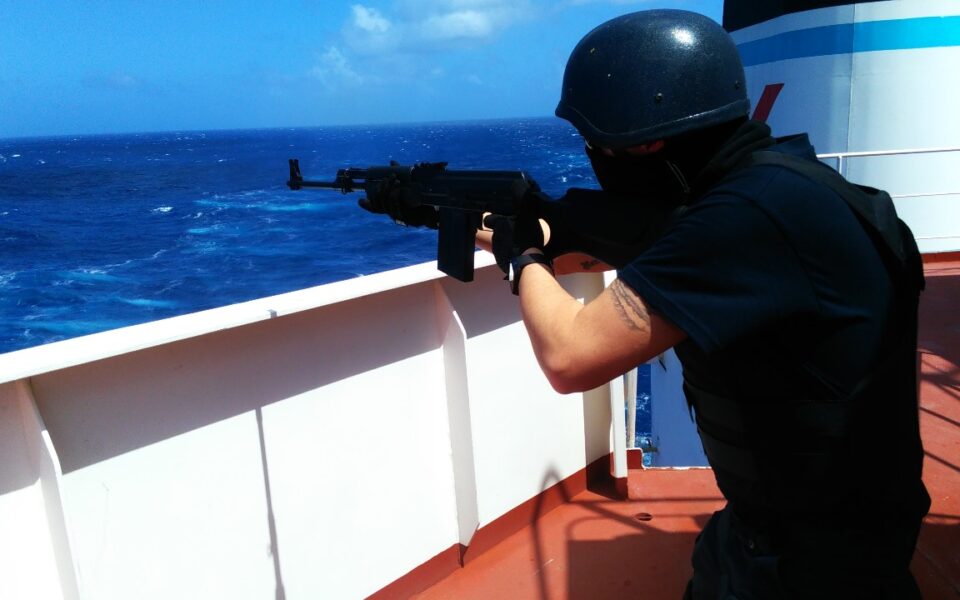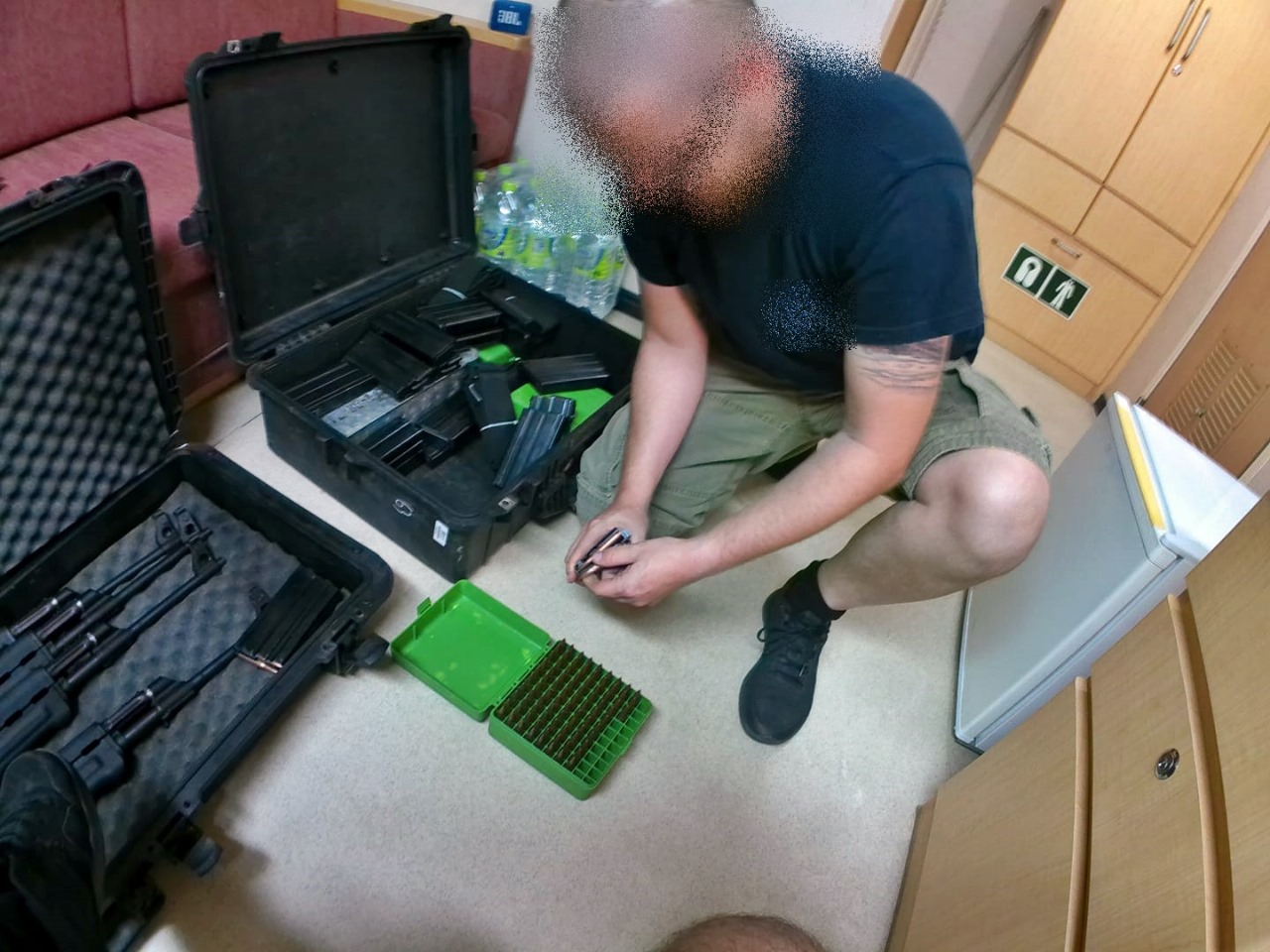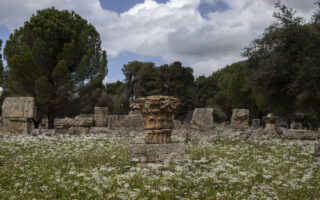Greek ship guards in the Red Sea
Vessel watchman explains details of the increasingly dangerous job

“We apply the rules of engagement in accordance with international law. If we detect a ship approaching in a threatening manner, we follow a specific procedure,” K.S. tells Kathimerini.
As Houthi rebel attacks in the Red Sea increase, the global demand for experienced and well-trained guards to protect ships and sailors is skyrocketing. The Red Sea and the Gulf of Aden are now high-risk areas for global shipping and the need for ship protection is great.
The area has been known to Greek mercenaries serving as armed guards on merchant ships since 2007, when the civil war in Somalia led to an upsurge in piracy incidents. The crisis in the Middle East and the Houthi attacks in “response” to Israel’s operations in Gaza are “raising the temperature” in the region, as well as the wages paid by companies to ship security personnel – a difficult and dangerous job that many Greeks choose to do. Kathimerini spoke with one of the most experienced Greek guards with dozens of missions in the disputed area on his “resume.”
K.S. was born in Athens and lives in Kyparissia in the Peloponnese. In 2017, at the age of 37, he signed his first contract with a private company as an armed guard on merchant ships. Until then, his only involvement with the Armed Forces had been his service in the Greek army commandos. In March of that year, having undergone a brief course of theoretical training, he embarked on his first voyage to the Red Sea and the Indian Ocean. “Our job is to protect the ship, the cargo and the personnel,” he tells Kathimerini.
With a finger on the trigger
‘We apply the rules of engagement in accordance with international law’
The guards board the ships from ports near the high-risk zone and escort them until they leave it. At predetermined points in the Red Sea or Indian Ocean, the “floats” are located. These are old anchored ships that serve as refueling stations. “That’s where the weapons depots are located. We usually take semi-automatics, AK-47s, M4s, Zastavas or FNS, ammunition, a bulletproof vest and a helmet. If you are escorting a yacht, you have better equipment, nightscopes, two-way radios etc,” says K.S.
The floating stations also have berths where mercenaries of various nationalities stay while waiting to board a ship. “When we start from Suez, we stop at the floating station located at geographical point 17 North. There we take our weapons. At the end of the journey, we are dropped off at point 60 East. There we stay for some time until the next ship comes.”
It takes a barge or tanker about four days to cross the dangerous zone of the Red Sea, from point 17 North to the Yemeni straits. All the while, the ship’s security team literally has its finger on the trigger. “We apply the rules of engagement in accordance with international law. If we detect a ship approaching threateningly, we follow a specific procedure. The ship uses its horn so that the pirates know that we have seen them. We then fire a flare and show them our weapons. If they don’t move away, we ask the captain for permission to fire warning shots. Then we aim at the engines to immobilize the vessel. If they open fire and we get engagement, that changes things. We go into self-defense mode and then the situation becomes difficult,” K.S. tells Kathimerini.
There are three to four guards on board each ship. They form the security team. The most experienced one is the team leader. As the ship passes the danger zone, the team leader is on the bridge and the team watches what is happening 360 degrees around the ship. “There are dozens of fishing boats sailing in the Bab-el-Mandeb Strait. Every fisherman has a Kalashnikov; it’s hard to tell the danger. When I’m a team leader I don’t leave the bridge until the ship comes out into the Indian Ocean,” says K.S. “When we go through the straits, we have our weapons resting on the crates with the magazines clipped on and we wear all our combat gear. We must always be ready for all eventualities.”
Attempted piracy
Most attacks take place in the early morning or when the sun is down. A few years ago, K.S. was called upon to deal with a difficult situation off the coast of Oman. He had boarded a cargo ship from the port of the Yemeni city of Al Hudaydah. As they were leaving the Gulf of Aden, they observed a dhow approaching them. “It followed us for four or five hours and when it got close, it lowered the skiffs, which started to approach at speed. When they were be less than 300 meters away, I fired a flare, but they didn’t stop. I asked the captain for permission to fire warning shots and fired the Zastava into the water five meters from their boat, forcing them to change course.” A few months later they were in the Yemeni International Recommended Transit Corridor (IRTC) where they were followed by seven dhows and 30 smaller skiffs.
“They usually attack from one side of the ship. If you keep your eyes open you can defend yourself effectively,” K.S. tells Kathimerini. “The Houthis launch terrorist attacks; they want to damage the ship. The Somalis, who are mainly interested in taking it over to ask for ransom, make different attacks. But the Iranians are on another level. We’re talking about a tactical army conducting raiding operations. When they come in Mi-8 helicopters armed with machine guns and rockets, you put down your weapons. You cannot counter such a threat.”
K.S. believes that attacks in the region will intensify further as many terrorist organizations operating in the region see the crisis as an opportunity. “From 2018 until last November, the Houthis carried out very few attacks. Now we are learning that incidents of Somali hijacking are increasing again. The situation will escalate, and security companies are looking for experienced and well-trained guards to protect their ships.” Wages can be as high as $300 in the “hot” areas, but the job is not for everyone. “There used to be a lot of Greek guards,” says K.S., “but the lion’s share is now taken by Indians and Senegalese who come with lower wages.”






